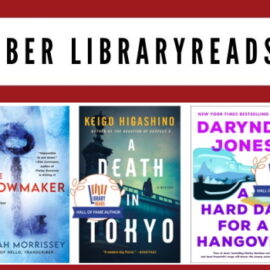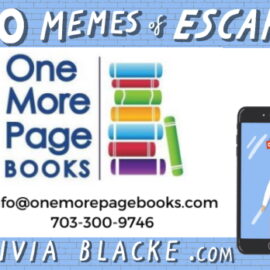There’s an old saying that you don’t know what you don’t know, and nowhere is that more apt than in publishing. I have a fantastic agent, an amazing editor, and belong to some fricking terrific writer’s groups, and still I manage to drop the ball a few times during my debut year because I didn’t know I was missing something.
Please note that my journey to traditional publishing might not be your journey and that this article is geared toward someone new to the game, but who already has an agent and has sold at least one book to a traditional publisher or is going on sub. The information may also be useful to writers at other stages of the publishing journey or on other paths, such as self-publishing. Your individual mileage may vary.
Be Your Own Advocate
If you’re an introvert or naturally shy like me, you’re gonna need to push that way down. You don’t have to change your whole personality, but you need to bite the bullet and speak up for yourself. And speak loudly.
Your agent and your editor have your best interests at heart (or, at least, they should), but you’re one of many clients/authors for them. You’re one of one for you. Be the squeaky wheel. There are no bonus points for being polite in this game. If every other author in the room is waving their arms around begging for attention while you’re sitting quietly in the corner with your hands folded on your lap, who do you think is going to get noticed? Check in with your agent or editor. Toot your own horn on social media. Star your own book on GoodReads. If someone says they’ll get back to you on Monday and they don’t, wait a day or two and then reach out to them.
For a lot of us newbie writers, this is going to be the hardest part of this journey. You’re not bothering anyone. You’re not being a pest. Even if it goes against cultural mores, you need to get over it and start advocating for yourself. No one has more at stake in your writing career than you do – it’s time to start acting like it.
Find a Writer’s Group
You have lots of friends. You have plenty of friends. But your friends likely know little to nothing about the publishing industry. I got a starred review, and I told my husband. His response? “That’s okay, honey, you’ll get plenty of five star reviews.” Sweet and supportive, yes but he didn’t understand that a starred review is the highest honor. I sold three books to a publisher, and called my father with the good news. He said “That’s very good. Plus I bought a copy, so now you’ve sold four books.” Again, he was trying to be supportive but he didn’t understand that I meant I’d gotten a three-title deal.
You need friends who understand the publishing industry. Not only have they been where you are and can share information that can help you muddle through, but the get what you’re going through. There’s a lot that you can’t – or at least shouldn’t – complain about online. Got a bad review? Don’t be that jerk that whines about that publicly. Keep it in your trusted circle. I cannot emphasize this strongly enough.
But how do you find your circle? I was lucky, and got invited but it might take some work on your part. If you’re a debut, search for debut writer’s groups. Talk to other writers at your agency, in your social media circle, or at your publisher. Ask people how they found their writer’s group, and ask if you can join them. Post online that you’re looking for a group – it can be local or online, based on where you’re at in your career or where you are in the country. Join industry groups so you can meet new people!
Start a Newsletter
Ugh. Newsletters are the absolute worst aren’t they? It’s just more spam. You put all this work into them and they’re just bugging people and clogging up their email, right? Wrong.
The people who are receiving your email signed up to get your newsletter. If they don’t want to read it, they can delete it or unsubscribe. But if they don’t want to hear from you, why are they still on the list?
Your newsletter doesn’t have to be difficult or expensive. Mailchimp and Mailerlite both have free or inexpensive plans. I personally send a newsletter about once a month when I have something to promote (upcoming book, appearances, articles, giveaways, sales, promotions) and less frequently when I don’t have any “news” but not so infrequently that people forget about me. In addition to mentioning anything you want to highlight about your book, pay it forward: promote the last book you read or your friend’s upcoming book. When you can, toss in freebies like recipes or short stories or sweepstakes to keep people interested!
Oh, and one last thing. Not to put more pressure on you, but your newsletter should be uniquely you. Be voicey. Be silly. Be you.
Ask For What You Want
Ever hear the phrase “the confidence of a mediocre white man”? You’re gonna need that. Never assume that anyone is going to give you anything. You want new graphics for your website? Ask your publisher to hook you up. Do you have a dream author you’d love a blurb from? Ask! If you’ve interacted with them, you can DM them, or if you don’t know them you can ask your editor or agent to email their editor or agent on your behalf (FYI: a personal note gets more attention than a generic request from an editor). If you have a question, don’t be shy! (Are you noticing a theme yet?) Ask your agent. Ask your writer’s group. Ask other authors even if you feel like you don’t know them well enough.
Psst, want in on a secret? Before I became a published author, I was always impressed that it seemed that all my favorite authors knew each other. It turns out that authors are in general pretty darn amazing people, and even the biggest, best selling author was once a newbie like you. Every established author I’ve had the pleasure of meeting is kind, generous, and approachable. They might have to turn down requests, especially if they are flooded with blurb requests, are under deadline, or are fighting burnout, but they don’t bite!
You know the old saying to keep your eyes on your own paper? Forget you ever heard that. If one of the authors you follow on socials posts that they have a feature article on a site, go to that site. Do they promote books like yours? Reach out, introduce yourself, and ask if they’ll do a piece on you, too. You want an article in your local newsletter or featured on a website? Find the contact information for them and email/call them. Ask your pub team first if they already were planning on sending something on your behalf or if they have a contact there but if it’s not on their radar, forge ahead with it. Ask bloggers if you can be a guest. Ask your friends and writer’s group to promote your posts and events.
Never assume that your publisher is going to do a fancy cover reveal for you or host a lavish launch party. If you want these things, you to have to ask them for it. And if they tell you that they weren’t planning on doing that or can’t do that, then start asking around to see if someone else can host it. Ask boostagrammers if they want to do your cover reveal. Ask that indie bookstore near you to host your launch party in exchange for being your exclusive source for personalized pre-orders.
And while we’re on the topic of bookstores — bookstores love authors! Whether you’re walking into your local BAM or you’re on vacation and you pass a B&N, stop in and introduce yourself. Ask if they carry your book. If they do, offer to sign it. Ask them to tag you when they post a picture of you signing your book in their store on social media (it helps if you have bookmarks or business cards with all your socials on them to make it easy for them to tag you), and when they post it, thank them profusely and boost their post. It may feel shy or awkward at first but booksellers love it when authors drop by to sign stock and I’ve made a few friends this way. While you’re at it, ask if they’re going to order your next book and offer to come in and sign those when they come in, too.
Your Website Needs a Media Kit
Imagine a reporter from the New York Times wants to do a feature on you. How hard are you to reach? Are your DMs locked down and your email address is a closely guarded secret? How do you expect that reporter to find you?
You should have a page that is easy to find – preferably on your website’s menu – called “Media” or “Contact.” (Example: https://oliviablacke.com/media/) It should have, at minimum, your contact information (a contact form is fine if you don’t want to list your email address), your agent’s name, agency, and their contact information (ask them what they want you to list), a bio, your official author photo, and high-res pictures of your cover(s). It doesn’t hurt to have links to reviews or author endorsements, articles where you’ve been featured, awards, and any other thing that might come in handy. Don’t post anything here that you don’t want public, but make it easy to contact you (or your agent).
Now that you have a media kit, put a reminder on your calendar to check your media kit every six months or so to make sure that it is up to date with your current bio and contact information, and that all the links still work.
Keep Track of All Appearances and Articles
A film agent contacts you (through your agent, hopefully) and they want to know where you’ve been featured. How long would it take you to compile a list? Can you still find links to an article that was published six months ago? Might you be forgetting a few lists that you made or an appearance you had last year?
The easiest way to avoid this problem is to keep a list. I use Excel but you can use whatever works for you. When my publisher gives me a marketing plan, I copy it into my list, and then add to it as links go live or articles are published. I keep track of trade/industry reviews (Kirkus, Publisher’s Weekly, Library Journal), blog appearances, any lists I appear on (“Most anticipated books for October!”), any articles I publish or mention me/my book(s), links to archived videos of virtual appearances, and any other thing I can think of. All of this goes into a webpage (example: https://oliviablacke.com/nmoe-articles/), which is cross linked to each book as well as my media page. If you can’t link something, you can still record that your book was featured on Good Morning America on 1/1/2021 or in Time Magazine on 2/2/2022 or was a Reese’s Bookclub Pick of March of 2023.
Let People Find You
Get a Linktr.ee account and load it up with your website, your socials, your newsletter signup link, your latest article, your next appearance, your active giveaway, your GoodReads profile, your buy links, anything and everything you can think of should go on that Linktr.ee. (example: https://linktr.ee/OliviaBlackeAuthor)
Now personalize it and post that Linktr.ee everywhere – in your bio on social, in your email signature (Don’t have an email signature? You need one!), in your newsletter – everywhere! Put your preferred contact information on your website, on your business cards, on bookmarks you can giveaway, on everything.
Hopefully some of this prompts you to take control of the often-chaotic publishing journey – and don’t forget to advocate for yourself!



